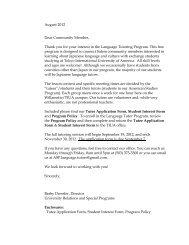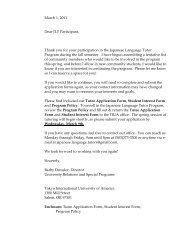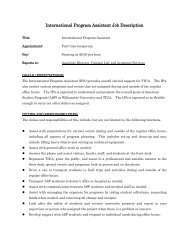2013 Spring CLA/ASP* Roommate Handbook - Tokyo International ...
2013 Spring CLA/ASP* Roommate Handbook - Tokyo International ...
2013 Spring CLA/ASP* Roommate Handbook - Tokyo International ...
You also want an ePaper? Increase the reach of your titles
YUMPU automatically turns print PDFs into web optimized ePapers that Google loves.
<strong>2013</strong> <strong>Spring</strong><strong>CLA</strong>/<strong>ASP*</strong><strong>Roommate</strong><strong>Handbook</strong><strong>CLA</strong> Student Version*American Studies ProgramHave a wonderful intercultural experience and asuccessful roommate relationshipIf you have cultural questions, contact us at any time Naomi Collette at or ext. 3351TIUA Associate Director of Residence Life & Wellness ServicesEmma Larkins at or ext. 3326Campus Life CoordinatorSarah Shinn at or ext. 3322TIUA Assistant Director of Student Life<strong>Tokyo</strong> <strong>International</strong> University of America Front Desk: ext. 3300P:\StudentServices\Student Life\Training Materials\for WU groups\<strong>Roommate</strong> <strong>Handbook</strong>\<strong>2013</strong> <strong>Spring</strong> <strong>Roommate</strong> <strong>Handbook</strong> for<strong>CLA</strong> students.docx
<strong>Roommate</strong> Starter KitCollege life is full of new challenges. One of the most exciting challenges is getting toknow your new roommate. Most American Studies Program (ASP) students have neverlived with a roommate before. A lot of American students haven’t had very muchexperience with a roommate either. We want to help you get to know each other better,understand each other’s cultures better, and help you develop a successful relationshipbased on mutual respect for each other’s personal life.We ask you to commit yourselves to open discussion and resolution of difficulties asthey arise. We invite you to learn from each other and enjoy your time together. Theseinitial activities will take about two hours. ASP students are required to complete andturn in the following three pages, so please coordinate a time to get together. It isa very small investment and you are on your way to mutual understanding. Do them allat once or make appointments to meet and talk about them.* Since the majority of the students are from Japan, some of the information in thishandbook is specifically related to Japanese values and culture. We also have studentsfrom Korea and China in our <strong>2013</strong> class. These international students have all beenstudying/living in Japan, so you may notice that they follow the same or similarcommunication patterns as their Japanese classmates.Table of Contents<strong>Roommate</strong> Activities (Homework for ASP students) Activity 1: All about home Activity 2: Let’s talk about life Activity 3: Make a plan together Activity 4: Getting to know your roommateWhere are you from? A conversation starterIce Breaker: Useful phrasesWhen conflict happens….Helpful cultural considerationsCultural concepts related to relationships and group dynamicsA word about drugs and alcoholImportant Phone NumbersP:\StudentServices\Student Life\Training Materials\for WU groups\<strong>Roommate</strong> <strong>Handbook</strong>\<strong>2013</strong> <strong>Spring</strong> <strong>Roommate</strong> <strong>Handbook</strong> for<strong>CLA</strong> students.docx
Activity 1: All about homeGet out your photos from home and talk about… Your family Your friends Hobbies/interests What you miss about home What you don’t missActivity 2: Let’s talk about life2. Go someplace together and chat. Talk about… Your study habits—when do you like to study? Quiet? Music? In yourroom? In the library? With people or alone? Your activities (what you do in your free time) Your classes How much sleep you need How clean do you like your room Your stuff (what do you like to share? Clothes? Food?) If you have a girl/boyfriend: How did you meet? How often to you spendtime together? Music What is important in your life What your roommate should know about you Your goals for studying abroad/What you want to accomplish at WU Other thingsActivity 3: Make a plan together3. Think of some things that you and your roommate can do together. Make a planto do something together. For example: Eat together (on campus or going off campus to a restaurant) Decorate your room Watch a movie Hand out at the Bistro coffee shop or Montag Den Go to Safeway or Salem Center Go to Bush Park or Riverfront Park Go to a WU sports event Attend a WU event/program Study together4. What activity did you plan to do together?________________________________________________________5. When will you do it?________________________________________________________P:\StudentServices\Student Life\Training Materials\for WU groups\<strong>Roommate</strong> <strong>Handbook</strong>\<strong>2013</strong> <strong>Spring</strong> <strong>Roommate</strong> <strong>Handbook</strong> for<strong>CLA</strong> students.docx
Activity 4: Getting to know your roommateDirections: Please discuss the following topics. This will help both roommatesunderstand what to expect from each other. Write down your own answers and yourroommate’s answers.Remember: This is NOT a contract, and you are encouraged to talk about these thingsthroughout the semester with your roommate(s) as your needs change.1) What time do you usually go to bed? ________________ME: I like to go to sleep at _____________.2) Do you need total darkness to sleep? (yes / no)ME: I (do / don’t) need total darkness to sleep.3) Do you need total silence to sleep? (yes / no)ME: I (do / don’t) need total silence to sleep.4) Do you study with music on or off? (radio on / radio off)ME: I like music (on / off) when I study.5) What time do you usually study? _____________________ME: I usually study at ________________.6) When do your friends usually visit our room? _____________________Me:____________________ My roommate: ______________________When is it ok for friends to visit? (ex. between 4-8pm, anytime, only on weekends,etc.): _____________________________________________How late is ok? ___________________________When should our friends not visit? __________________________7) Do you have a boyfriend/girlfriend? (yes / no)When does he/she usually visit? ________________________ME: I (do / don’t) have a boyfriend/girlfriend.ME: My boyfriend/girlfriend usually visits at ______________________ Is that ok?8) Decide together: Are there some things in the room you want to share? (yes / no)If “yes,” what are they?: ________________________________Are there things that you don’t want to share? (for example, the radio, refrigerator,food, music, videos, clothes, etc): __________________________________________________________________________9) What temperature do you usually like the room? (warmer / cooler)ME: I like (warmer / cooler) temperature.P:\StudentServices\Student Life\Training Materials\for WU groups\<strong>Roommate</strong> <strong>Handbook</strong>\<strong>2013</strong> <strong>Spring</strong> <strong>Roommate</strong> <strong>Handbook</strong> for<strong>CLA</strong> students.docx
Do you like it cooler when you sleep than during the day? ( yes / no )Me:____________________ My roommate: ______________________10) How clean do you like the room to be? (always / sometimes / never clean)Me:____________________ My roommate: ______________________Does a messy room bother you? ( yes / no )Me:____________________ My roommate: ______________________11) When I feel bad, something that makes me happy is….Me:My roommate:12) I like to be alone when:Me:My roommate:13) You will know I am angry when….Me:My roommate:14) Things that make me nervous or tense are….Me:My roommate:15) Things I do to relieve stress are….Me:My roommate:16) Things that annoy me are….Me:My roommate:17) I would describe myself as….Me:My roommate:Interview Date: ______________________________________P:\StudentServices\Student Life\Training Materials\for WU groups\<strong>Roommate</strong> <strong>Handbook</strong>\<strong>2013</strong> <strong>Spring</strong> <strong>Roommate</strong> <strong>Handbook</strong> for<strong>CLA</strong> students.docx
Where are you from? A conversation starter<strong>Tokyo</strong> <strong>International</strong> University (TIU)is in Saitama Prefecture inKawagoe, Japan.P:\StudentServices\Student Life\Training Materials\for WU groups\<strong>Roommate</strong> <strong>Handbook</strong>\<strong>2013</strong> <strong>Spring</strong> <strong>Roommate</strong> <strong>Handbook</strong> for<strong>CLA</strong> students.docx
Where Are You From?Your Turn!P:\StudentServices\Student Life\Training Materials\for WU groups\<strong>Roommate</strong> <strong>Handbook</strong>\<strong>2013</strong> <strong>Spring</strong> <strong>Roommate</strong> <strong>Handbook</strong> for<strong>CLA</strong> students.docx
Ice BreakerHere are some quick and easy words that will encourage bonding between you and your roommate.Share some common phrases in your native language - it’s a great icebreaker! Also, this will show thatyou are interested in their culture and you are making an effort to get to know them.ENGLISH PRONUNCIATIONS JAPANESEHello KOHN-nee-chee-wah KONICHIWAWhat's up? / How's it going? Cho-Shee -Doe Choushi dou?Good Night oh-YAH-soo-mee-nah-sigh OYASUMINASAINice to meet you hah-JEE-may-mah-shee-tay hajimemashiteHow are you?/Fine, thank you ee-KAH-gah dess-kah / GEN-key dess GENKI desuka? / genkidesuMy name is wah-TAH-shee wa…dess watashi wa…desuWhat is your name? oh-nah-MAH-eh wa NAHN dess-ka ONAmae wa Nan desu ka?Please give me… … koo-dah-SIGH … KUdasaiThank you ah-ree-GAH-toh go-ZA-ee-mas ARigato gozaimasuYou’re welcome DOH-ee-tah-shee MAHSH-tay Dou itashi mashiteExcuse me soo-mee-mah-sen sumimasenYes / No HIGH / ee-EH hai / iieUh-huh / Yeah uh - n (grunt noise) UnMaybe TAH-boon tabunOh, really? hoh-n-toe Hontou?Let’s go ee-KEY-mah-shoh IkimashouJust a minute (please) CHO- -TOH MAH- - tay (koo-dah-sigh) Chotto matte (kudasai)S/he is not here right now. ee-mah ee-mah-sehn Ima imasenS/he will be back soon. soo-goo mo-doh-ree-mah-soo Sugu modorimasuLong time no see! Hee-saw-she-boo-ree HisashiburiThat's great! yoh-KAH - - tah-neh Yokatta ne!Wow! soo-go-ee Sugoi!Cool! kaw - - koh-ee Kakkoii!No kidding! OOH-sow-deh-show Uso desho!Finally! YAH - - TAH Yatta!Lucky! EE-naw iina!Hang in there! GAH-n-BAH-RAY Ganbare!What a waste MO - - tah-ee-naw-ee-yoh Mottainai yoIt's all gone na-koo-na - - chaw - - tah-yoh Nakunacchatta yoShoot! / Oops! she-MAH - - tah Shimatta!Yum! oo-MAH-ee Umai!Gross! mah-ZOO-ee Mazui!Seconds please. oh-kaw-wah-ree-koo-dah-sigh Okawari kudasaiI'm full oh-nah-kah-gah-EE - - pah-ee Onaka ga ippaiP:\StudentServices\Student Life\Training Materials\for WU groups\<strong>Roommate</strong> <strong>Handbook</strong>\<strong>2013</strong> <strong>Spring</strong> <strong>Roommate</strong> <strong>Handbook</strong> for<strong>CLA</strong> students.docx
When Conflict Happens….It is never easy to live in the same room as someone else. It is natural to haveproblems sometimes, and it is OK to feel that you need more time alone. It is veryimportant AND it’s OK to talk about these things when they happen.When a problem occurs, different people have different reactions. For example, somestudents want to talk about their feelings openly, and some students are very shy. It isimportant to communicate with your roommate and have open conversations about yourproblems. It may not be easy at first, but it helps your roommate understand that thereis a problem.MisunderstandingsDue to personality differences,differences in backgrounds,differences in experiences anddifferences in culture, it is not alwayseasy to figure out what is botheringyou.Sharing your RoomThe room belongs to both of you – youneed to say what is bothering you. Discuss things in a polite way Your roommate can understandyour feelings better You can solve the problem.Problems usually come frommisunderstandings Your roommate may not realizethat his/her behavior bothers you. Your roommate may not know ifsomething seems strange to you. Some Japanese students areafraid that if they bring up a problem itwill end the friendship. They need toknow that this is not true. If you talk about it, you can work itout!An example of how you can workthrough a problem:<strong>Roommate</strong> A: “I would like to discusssomething with you.”<strong>Roommate</strong> B: “OK. Let’s go to the loungeso we can talk.”(In the lounge)A: “Last night, you listened to music evenafter I went to bed. I felt frustratedbecause I couldn’t sleep.”B: “Oh, I didn’t notice that it bothered you.I’m sorry. Next time if you’re sleeping I willuse my headphones.”A: “Thank you for understanding. Nexttime I will tell you more directly that I can’tsleep.” It’s important to find a place whereboth people feel comfortable to talk.This can be inside or outside yourroom. Create a solution together: “How canwe solve this problem?” or “Whatcan we do?” And remember, if you make apromise to each other, KEEP IT!P:\StudentServices\Student Life\Training Materials\for WU groups\<strong>Roommate</strong> <strong>Handbook</strong>\<strong>2013</strong> <strong>Spring</strong> <strong>Roommate</strong> <strong>Handbook</strong> for<strong>CLA</strong> students.docx
Helpful cultural considerationsUnderstanding and communicating with your roommate can be positive and rewarding,yet difficult at the same time, especially if your roommate is from a different culture. Thefollowing topics are to help you understand one another’s point of view. These topicsmay not appear to be big issues, but they have the potential to develop problems if youdo not talk to your roommate and understand their position. It’s highly recommendedthat you talk to your roommate about them as soon as possible. If you do not agreeabout some topics, you should try to develop a compromise. Remember to take intoconsideration and be sensitive to personality differences.<strong>Roommate</strong>s Just the same as American students, international students are hoping forsomeone who: has similar interests, is interested in them, is patient, is open to learningabout their native culture, will introduce them to friends, etc.Friends in the Room <strong>International</strong> students may feel uncomfortable aboutAmerican students’ “Open Door” attitude, which allows both male and female friends towalk in the room at any time. Conversely, Americans may feel just as uncomfortablewhen their international roommate’s friends walk in without knocking, or enter the roomwhen no one is there. It can be very beneficial to establish visitation hours and entranceguidelines at the beginning of the semester.Friends of the Opposite Sex <strong>Roommate</strong>s having people of the opposite sex in theroom have made many ASP students uncomfortable. American students are relaxedabout showing affection in public and being seen with their significant others. Americansfrequently invite their boy/girlfriends into the room to study, talk, or spend the night.Many ASP students tend to feel uncomfortable around their roommate’s boy/girlfriend.You need to talk about the issue, if necessary. Ask your roommate how s/he reallyfeels. Then ask again because sometimes Japanese students do not really understandthe meaning or implications of “Do you mind if my boy/girlfriend come/stays over?”Sleep Compared to other cultures, American students tend to go to bed relatively early,that is, before or around midnight where as some ASP students tend to stay up all night,studying or socializing, and sleep during the day. These different sleeping patterns canbe very frustrating for American roommates. It’s important to talk to your roommateabout your individual study and sleeping habits and to work out a schedule together ifpossible.Study Habits Some ASP students stay up quite late. There are several possiblereasons. They may be tired after having to concentrate on talking in English in class allday, and they take a nap before they start their homework, which makes them start late.English is not their first language, and they need to spend more time on their work thanAmerican students, making their studying take longer. Also, most ASP students areconditioned since age 12 (junior high) to begin studying around 10pm since their school,club, and tutor schedules typically end around 9pm. These study habits continue intocollege.P:\StudentServices\Student Life\Training Materials\for WU groups\<strong>Roommate</strong> <strong>Handbook</strong>\<strong>2013</strong> <strong>Spring</strong> <strong>Roommate</strong> <strong>Handbook</strong> for<strong>CLA</strong> students.docx
Health ASP students tend to put up with pain until it becomes intolerable. Payattention to them. Encourage your roommate to go to the Health Center for care. Tellthem to see their CM after university office hours and on weekends.Smoking Smoking is very prevalent in Japan and other Asian countries. It does notcarry the stigma of being hazardous to a person’s health. In fact, Japan still has thehighest life expectancy rate in the world. If your roommate smokes, you should expressyour feelings about smoking, and also set some guidelines for smoking or not smokingin the room. It is against WU policy to smoke inside any building on campus.Gift Giving This is a common practice in Japan. Thank you notes are appropriate.Gifts are always given when going to someone’s home for the first time (in Japan). Giftsare also given as a symbol of thoughtfulness, appreciation, and friendship. You don’thave to worry about gift-giving. If you feel inclined, something small such as a WUpostcard with a note would be a great gesture.Social Interaction If you think ASP students seem formal, stiff, cautious, polite, shy,embarrassed, or hesitant, you are encouraged to initiate conversation. They are in anew country, and are not sure of the best way to communicate with you yet.Making Friends In Japan making friends is a little different than in the U.S. Here wetend to open up right away and expect others to do so also. This shows the intention ofbuilding friendship. In Japan, people tend to take a little time. Also in Japan peopletend to rely on introductions from friends to make other friends. Introducing your ASProommate to your other friends is like an instant character reference for those people.Your roommate will be able to feel more comfortable and make friends more quickly thatway.Establishing Relationships The more investment, the greater the return. Setaside a little extra time for talks or activities. It’s worth it! Little things really count (i.e.,going along on errands, getting off campus, doing something a bit different, and goingout for coffee). If you go out of your way for them, they will go out of their way for you.Communication Open-minded communication between roommates is the mostimportant factor in a good relationship. When speaking with your ASP roommate,especially at the beginning of the semester, slower speech and a fairly basic vocabularyshould be utilized. This way they can get used to your speech pattern and languageusage. Remember that if you use slang, teach it to your roommate, discuss issuesprivately with them, and remember that both of you are working towards understandingeach other. Look for clues of frustration or anger (i.e., withdrawal and facialexpressions, a sudden change in personality). For example, if your roommate isfrustrated or disapproves, he or she might say, “It’s very difficult.” Ask for clarification ifyou are unsure that your message is understood, and clarify if you understand theirmessage.P:\StudentServices\Student Life\Training Materials\for WU groups\<strong>Roommate</strong> <strong>Handbook</strong>\<strong>2013</strong> <strong>Spring</strong> <strong>Roommate</strong> <strong>Handbook</strong> for<strong>CLA</strong> students.docx
Language Also, one of the biggest complaints of both ASP and <strong>CLA</strong> students is thatwhen their roommate’s friends hang out in the room, they tend to speak only amongstthemselves and/or all in Japanese. <strong>Roommate</strong>s are thus unintentionally made to feelvery much excluded and left out of the conversation. As with any roommate, it’simportant to be as considerate and inclusive as you possibly can. Be patient and letyour roommate know how you feel if it bothers you. When talking with your roommate itis important to remember that it can be very difficult for ASP students to say, “No.” Thisis because they don’t want to offend or disappoint others. Also, “Yes” or “Uhn” (theequivalent of “uh-huh”) doesn’t necessarily mean “Yes, I understand/agree with you.”More often it means that they are listening. Sometimes they don’t have the Englishskills to be able to explain. If you are not sure what your roommate means, ask forclarification.Problem Solving When something upsets you, wait to react. Most likely there is amisunderstanding or something is not communicated clearly. Try to imagine bothperspectives to see what is really going on. Talk with your roommate regularly aboutissues that concern both of you. It takes time, patience and sensitivity to get thingsright, but it can be done!Patience, open mind, open heart, open eyes, open ears!Culture vs. Personality Don’t assume that all ASP students are the same. Try todifferentiate between culture and personality conflicts and behavior patterns.P:\StudentServices\Student Life\Training Materials\for WU groups\<strong>Roommate</strong> <strong>Handbook</strong>\<strong>2013</strong> <strong>Spring</strong> <strong>Roommate</strong> <strong>Handbook</strong> for<strong>CLA</strong> students.docx
Japanese Concepts Related to Relationships & Group DynamicsThese terms relate to Japanese concepts of friendship. Some share similarities with Americanconcepts, but others do not. Non-Japanese roommates need to keep the differences in mindwhen friendships evolve. Japanese roommates could explain these concepts if non-Japaneseroommates have questions.Amae:Uchi:Soto:Enryo:Senpai:Kohai:Tatemae:Honne:(Sub-conscious value) Root word: “sweetness.” One develops “amae” towards friends, or inbetween people who have a good connection with each other. Allowing oneself to depend onanother, or ask for things & favors that one typically doesn’t ask a stranger. The classicalexample is that one has “amae” towards one’s own mother, or towards a good friend.(Sub-conscious value) Root word: “inside.” The concept of an inner-group as opposed to the“world out there” or soto. Every family, or sports team, or student organization, for example,is an uchi. There is shared information, experiences, or general “friendly feeling” within anuchi group. A roommate relationship is also a classic uchi situation, but needs to bedeveloped through trust and shared experiences(Sub-conscious value) Root word: “outside.” This refers to any person or situation that liesoutside of a given group, or uchi. Similar to the English concept of “stranger.” One doesn’tshare privileged information with an outsider. Also, people naturally act more formallytowards a stranger. It is natural to treat a new acquaintance as being soto. It is important tomake an effort to leave this stage and form an uchi relationship in a roommate situation.(Conscious thought) Social self-restraint, or “holding back.” Typical with someone we don’tknow very well, or soto. “Would you like another piece of cake?” With a stranger (soto),typically one says no. With a good friend (uchi), one would say yes. This is so as not toappear selfish, or greedy. The opposite of amae.(Conscious thought) Respect given to a “senior.” In this case, senior means anyone who isranks higher in any given organization or relationship. An upperclassman is a senpai, and inJapan, demands an enormous amount of respect. A Japanese roommate will look towardsyou as a senpai, since you are much more familiar with life in America, WU, etc. and havebeen here longer. This means they may manifest enryo, or restraint, in order not to angerthe senpai. One must take steps to de-formalize the relationship and be friendly, to sharedecisions and communicate in a free manner.(Conscious thought) A “junior.” The opposite of senpai. A kohai must always treat a senpaiwith respect, and defer decision making to the senpai. If a TIUA student puts him or herselfin this situation, it can become very stressful and difficult to enjoy daily life.(Sub-conscious value) Root word: “Built in front.” The social persona, or the personality oneexpresses in public. In Japan, high priority is placed on keeping a respectable front, andhiding shameful or private things within oneself or one’s uchi group in order to preservesocial harmony. Example: Hiding the fact that one may not like something everyone elseseems to enjoy.(Sub-conscious value) Root word: “True feeling.” What one hides from public eyes, or whatone truly thinks or feels. Honne is only allowed to be seen by another in an uchirelationship. The opposite of Tatemae.P:\StudentServices\Student Life\Training Materials\for WU groups\<strong>Roommate</strong> <strong>Handbook</strong>\<strong>2013</strong> <strong>Spring</strong> <strong>Roommate</strong> <strong>Handbook</strong> for<strong>CLA</strong> students.docx
A word about alcohol and drugsJapanese and American cultures have very different views of alcohol and drugs.Alcohol:In Japan and other Asian countries, alcohol is often present in social settings for collegestudents. The legal drinking age in Japan is 20 years old. This is almost never enforcedand students who do drink are frequently drinking by the age of 18. Almost all of thestudents in ASP are underage in the U.S. They are moving from an environment where,if they wanted, they could drink freely to one with a much stricter enforcement of a higherdrinking age. Because of this, we ask your help in engaging in activities that do notinvolve alcohol. Please help with this difficult part of their transition by acting as a rolemodel.Consequences:While the consequences for a U.S. student may not be great if caught drinking underageby police at an off campus party, the consequences for an ASP student could includeimmediate dismissal from the program and being required to return to their homecountry.Drugs:Most ASP students are very uninformed about drugs. Drugs are, in general, much lesscommon in Japan than they are in the U.S. Consequences for drug use are much moreextreme in Japan. A person caught receiving or in possession of marijuana will go to jailfor up to a five year sentence. Most ASP students are coming from an environment inwhich they have no exposure to marijuana to one in which they will almost all come incontact with someone who uses.Your example will have great impact on the ASP students you come in contact with.Because of this, it is critical that you do not encourage ASP students to engage inactivities that involve drugs. We also ask your help in not downplaying the seriousnessof experimenting with marijuana or other drugs.If <strong>CLA</strong> students say, “It’s no big deal”, ASP students will get the wrong message. ForASP students, it is a very big deal and could literally ruin their college careers and theirlives. The level of risk for ASP students is much greater, and we appreciate your help inrespecting that.Consequences:The consequences for a U.S. student who gets caught on campus or off campus inpossession of a small amount of marijuana may be seen as less severe. If an ASPstudent gets caught on campus or off campus in possession of marijuana, the studentwill most likely be expelled from TIU (Japan) or their home university. This means he orshe would be blackballed from the university system, unable to enter any other universityand ultimately unable to obtain a good job. Such a story would be national news andwould cause the student’s family to suffer a major loss of face.Note: We try to treat ASP students just like any other <strong>CLA</strong> student; however, theyare subject to TIU regulation. We need to work together to bridge thesecultural differences.P:\StudentServices\Student Life\Training Materials\for WU groups\<strong>Roommate</strong> <strong>Handbook</strong>\<strong>2013</strong> <strong>Spring</strong> <strong>Roommate</strong> <strong>Handbook</strong> for<strong>CLA</strong> students.docx
Important Phone NumbersTIUA Campus Life AdministratorsNaomi Collette, Associate Director of Residence Life & Wellness Services…… 503-373-3351Barby Dressler, Director of University Relations & Special Programs …………… 503-373-3330Tomoko Harpster, Associate Director of Campus Life & Academic Services……. 503-373-3301Emma Larkins, Campus Life Coordinator…………………………………………. 503-373-3326Masaki Shimada, Director of Campus Life & Academic Services…………………. 503-373-3304Sarah Shinn, Assistant Director of Student Life…………………………………. 503-373-3322WU Office of Residence Life……………… 503-370-6212Campus Safety ……………………………………………. 503-370-6911P:\StudentServices\Student Life\Training Materials\for WU groups\<strong>Roommate</strong> <strong>Handbook</strong>\<strong>2013</strong> <strong>Spring</strong> <strong>Roommate</strong> <strong>Handbook</strong> for<strong>CLA</strong> students.docx






